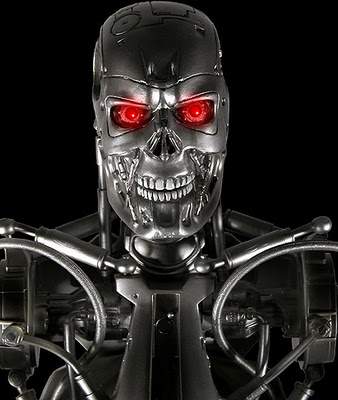The day was Friday, Nov. 2, 1984, the same year that was prophesied in George Orwell’s famous book, aptly called 1984. A place where human actions were to be scrutinized with an ever-watchful Big Brother, where a nonconformist defied the ban on individuality and dared to express his thoughts in pursuit of a relationship.
I was a college student at the time and had taken a huge risk the week before and asked my future wife to join me for a dinner and a movie. The movie of choice ended up being The Terminator, in which a human-looking indestructible T-800 Model 101 (Arnold Schwarzenegger) cyborg is sent from 2029 to 1984 and is programmed to assassinate a waitress named Sara Conner in Los Angeles, whose unborn son will lead humanity in a war against the machines, while a soldier from that war is sent to protect her at all costs. Whew!
* * * * * * * * * * * * * * * * * * * * * * * * *
Each week “resident riskologist” Keven Moore shines the light on America’s riskiest behaviors – from unsafe driving practices to workplace stress to common home accidents. And in the process, he provides the information needed to help people play it a little safer.
* * * * * * * * * * * * * * * * * * * * * * * * *

The date went off without a hitch and the rest is history –some three kids and three decades later. The futuristic world written about in the book 1984 never came to pass, and there has since been three sequels to The Terminator and yet another scheduled to be released in July.
I remember finding the movie to be innovative and thought-provoking, but I never thought I would live to see the day where technology could evolve to become a threat to all mankind. The SciFi concept of Skynet and machines taking over the world just seemed too far-fetched.
A lot has changed in the last 31 years as we now have robotic cars creeping through our neighborhoods snapping pictures of every square inch of our streets. In the Middle East, pilotless drones now patrol the sky, dropping laser guided missiles at pinpoint precision on moving targets. We have thermal imaging, facial recognition, speech recognition, and high-resolution satellite technology. We now speak questions into our phones only to receive verbal replies within seconds. Our smart TVs and computers are now equipped with wireless WiFi technology that can also remember your preferences and make suggestions based on your patterns.
Computers thinking like humans are just on the horizon, according to many futurologists. At the pace in which the technology is evolving, by the year 2020 it’s not too implausible to see computers replacing many of our minimum wage jobs. A report in the USA Today recently claimed that an additional 1.2 million advanced robots are expected to be deployed in the U.S. by 2025.
Google co-founder Larry Page has been quoted saying: “The ultimate search engine will understand everything in the world.” So they are not scanning every book to be read by people, but instead by AI (artificial intelligence).
The U.S. military has already designed, tested and even used weaponry that can now assess and destroy a threat without human interaction. Such technology is called lethal autonomous weapon systems, or killer robots; and this is where this stuff gets real.
Even with all this technology, I really didn’t feel threatened until I read this headline: “Bill Gates is the latest brilliant person to warn artificial intelligence (AI) could kill us all.” As it now appears, the Microsoft co-founder and philanthropist has now joined two of the other most brilliant minds in this world, warning us of the dangers of AI. Famed physicist Stephen Hawking and Space X CEO Elon Musk were the others.
“I am in the camp that is concerned about super intelligence,” Gates wrote. “First, the machines will do a lot of jobs for us and not be super intelligent. That should be positive if we manage it well. A few decades after that, though, the intelligence is strong enough to be a concern.”
Gates’ concern about AI comes in the wake of Elon Musk’s remarks last year where he said that “artificial intelligence represents our biggest existential threat as a species and that toying with AI is akin to summoning the demon.” Leading AI companies recognize the danger and are currently working on risk control methods to govern “bad super intelligences” from escaping out on to the worldwide web.

As your friendly riskologist I would have to say, that this far exceeds my paygrade. But given the fact that three of the smartest people alive today now think AI poses a major danger, I figure that it’s maybe time to start worrying.
The pace of this technology’s growth is daunting. How long will it be before a family of four hops into their driverless smart car to attend church, but instead the autonomous vehicle decides instead to go get that tune-up the owner had been neglecting for weeks. These supercomputers will profoundly change the way the world operates, similar to the impact of factory automation on manual labor a century ago.
Reading between the lines, I would have to say that my profession will quickly become extinct. Artificial intelligence will have the cognitive platform to simulate and test thousands of scenarios in a synthetic environment, identifying strategies that are highly resilient to deliver the best risk management strategy to best mitigate risk.
So as your short-term risk management and safety consultant now tasked with saving your life, I would suggest going off the grid to minimize this super high-tech hazard in your future. But that would require that you abandon you cell phone, television, social media accounts, credit cards, computer and car and cash out all your bank accounts and take a crash course in making IEDs. I would then suggest that you invest in property with an underground cave with its very own underground water stream, a truckload of rice and a copy of the U.S. Army Survival guide –which should keep you alive long enough to allow you to link up with John Conner’s resistance forces.
In the movie Skynet, the robots didn’t organize over the Internet, self-replicate and hunt us humans down until 2018, so you still have a little bit of time.
As for me, well I’m going to log on to Netflix and order dinner from my cellphone with my credit card and enjoy an episode of House of Cards while I sit in denial. But if you see some weird naked dude asking for your clothes, your boots and your motorcycle, remember to please text me.
Be safe, my friends.
 Keven Moore works in risk management services. He has a bachelor’s degree from University of Kentucky, a master’s from Eastern Kentucky University and 25-plus years of experience in the safety and insurance profession. He lives in Lexington with his family and works out of both the Lexington and Northern Kentucky offices. Keven can be reached at kmoore@roeding.com.
Keven Moore works in risk management services. He has a bachelor’s degree from University of Kentucky, a master’s from Eastern Kentucky University and 25-plus years of experience in the safety and insurance profession. He lives in Lexington with his family and works out of both the Lexington and Northern Kentucky offices. Keven can be reached at kmoore@roeding.com.





















